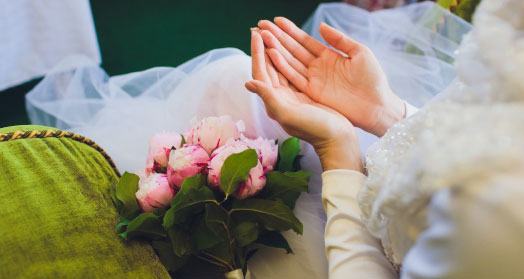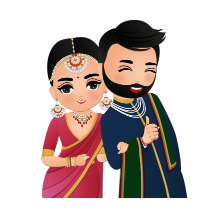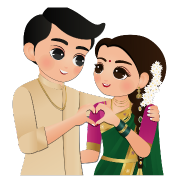Culture and Tradition

Introduction:
Welcome to My Wedding Palette, your ultimate guide to Indian
weddings and the kaleidoscope of traditions that accompany them. In this blog
post, we embark on a delightful journey into the world of Muslim weddings,
exploring the rich tapestry of pre-wedding, wedding day, and post-wedding
rituals that make this celebration a true extravaganza of love. Join us as we
unravel the beauty and significance behind each ceremonial moment, offering you
a glimpse into the enchanting customs that shape a Muslim wedding.
Pre-wedding Rituals:
The road to matrimonial bliss begins with a series of
pre-wedding rituals that infuse the air with anticipation and joy. These
rituals set the stage for the grand union, capturing the essence of Muslim
culture and traditions.
1. Salatul Ishtikara:
Arranged marriages hold a significant place within the
Indian Muslim community, and Salatul Ishtikara marks an important step in the
process. The religious head seeks Allah's consent for the intended union
through a special prayer, while the couple seeks guidance and blessings for
their future together.
Timeline: Usually performed weeks or months before the
wedding.
2. Imam Zamin:
Symbolizing the acceptance of the bride into her future
family, Imam Zamin is a heartwarming ritual. The groom's mother visits the
bride's home, bearing gifts and tying a gold or silver coin wrapped in a silk
scarf around the bride's wrists. This gesture signifies the formal initiation
of the bride into her new family.
Timeline: Occurs a few days before the wedding
3. Mangni:
Mangni seals the intention of marriage between the families
and betroths the bride and groom to each other in the eyes of society. During
this ceremony, close friends and relatives witness the exchange of rings and
share joyful moments while showering each other with gifts.
Timeline: This takes place a few weeks or months before the
wedding.
4. Manjha:
Manjha, a playful and
mischievous event, involves applying a turmeric paste to the bride's face,
hands, and feet. This ritual observed a day or two before the Nikah ceremony,
signifies the bride's preparation for the upcoming wedding and her seclusion
until the special day.
Timeline: Held a day or two before the wedding.
5. Mehendi:
The Mehendi ceremony brings together women of the family in
an artistic celebration. Intricate henna paste designs adorn the bride's hands
and feet, with the groom's initials cleverly hidden within the patterns. This
joyful gathering is filled with music, laughter, and a beautiful display of
artistic talent.
Timeline: Conducted a day or two before the wedding.
6. Sanchaq:
Sanchaq is a pre-wedding ritual where the groom's family
visits the bride's home, bearing gifts and the bridal outfit for the Nikah.
This delightful exchange also includes matching jewelry, accessories, and
sometimes even perfumes and cosmetics as a gesture of love and acceptance.
Timeline: This occurs a day or two before the wedding.
Wedding Day Rituals:
The wedding day is the culmination of all the anticipation
and preparations, where the couple joins in holy matrimony surrounded by their
loved ones. Let's delve into the captivating rituals that unfold on this
auspicious occasion.
1. Baraat:
The groom embarks on a grand journey from his home to the
wedding venue, accompanied by his close friends and relatives. A beautifully
decorated car, sent by the bride's family, awaits him. This joyous procession,
known as Baraat, creates a vibrant spectacle as the wedding party sets off.
Timeline: Happens on the wedding day, usually in the
evening.
2. Welcome:
As the groom arrives at the wedding venue, the bride's
family greets him with warmth and hospitality. A special welcome is extended to
him, and his brother-in-law offers him a drink of sweet Sherbet, symbolizing
both families' acceptance and unity. The atmosphere is filled with excitement
and anticipation as the festivities begin.
Timeline: Takes place at the wedding venue upon the groom's
arrival.
3. Nikah:
The Nikah ceremony holds profound significance in a Muslim
wedding. Officiated by a religious priest or Maulvi, the bride, and groom are
seated separately, surrounded by their respective families and friends. The
Maulvi leads the ceremony, reciting prayers and guiding the couple through the
process of exchanging vows and seeking consent for marriage. The recital of
vows, the signing of the Nikahnama (marriage contract), and the blessings of
the elders create an atmosphere of love, commitment, and divine union.
Timeline: Conducted on the wedding day, when the couple
officially ties the knot.
4. Arsi Mushraf:
Arsi Mushraf is a cherished ritual where the couple gets
their first glimpse of each other after the Nikah has been solemnized. A mirror
is placed between them, with the Holy Quran atop it, signifying the blessings
of Allah. As they look into the mirror, the couple witnesses the reflection of
their beloved spouse, symbolizing their eternal bond.
Timeline: Follows the Nikah ceremony, allowing the couple to
see each other for the first time.
Post-wedding Rituals:
After the wedding ceremony, a series of post-wedding rituals
take place, adding the final touches to this joyous celebration and setting the
tone for the couple's journey ahead.
1. Rukhsat:
In the Rukhsat ceremony, the bride bids a tearful farewell
to her family as she leaves for her husband's home. As a gesture of welcome and
guidance, her mother-in-law places the Holy Quran on her head, symbolizing her
new role as a wife and a member of her husband's family.
Timeline: Occurs on the same day or the next day of the
wedding
2. Walimah:
The Walimah ceremony is a grand reception that marks the
public declaration of the marriage. The bride and groom are seated on a regal
throne atop a stage, where they receive blessings and well-wishes from family
members and guests. A sumptuous feast awaits, with a delightful spread of
traditional Muslim delicacies, such as Biryani and Meat Korma, creating a
festive atmosphere of joy, love, and celebration.
Timeline: Hosted by the groom's family, usually a day or a
few days after the wedding.
3. Chauthi:
The Chauthi ceremony involves the bride and groom visiting
the bride's parent’s home on the fourth day after the wedding. They are
welcomed with a lavish lunch and showered with blessings and gifts from their
families. This ritual symbolizes the love and support they will receive from
their respective families as they embark on their new journey together.
Timeline: Occurs on the fourth day after the wedding
Conclusion:
In the tapestry of Indian weddings, Muslim ceremonies weave
a captivating story of love, tradition, and togetherness. The pre-wedding
rituals set the stage for the grand union, the wedding day rituals bring forth
divine blessings, and the post-wedding rituals mark the beginning of a
beautiful new chapter. At My Wedding Palette, we embrace the vibrant colors,
customs, and cultural heritage of Muslim weddings, providing tips, ideas, and
inspirations to make your celebration a true masterpiece of love. Join us on
this enchanting journey, as we continue to explore the myriad of Indian wedding
traditions that paint a beautiful canvas of joy and unity.
*Anchor Keywords: Muslim wedding rituals, Indian Muslim
wedding traditions, Engagement ceremony between the bride and groom, Muslim
wedding practices in India, Muslim bridal Mehendi ceremony, Wedding gifts for
the bride, Muslim wedding Baraat procession, Muslim wedding traditions

Latest Articles

Destination

Wedding Favours & Gifts

Pre-Wedding Planning

Videographers & Photoshoot

Jewellery

Mehndi

More Blogs

 12
12


Follow Us
For More Inspiration On Instagram
Lorem ipsum dolor sit amet, consetetur sadipscing elitr, sed diam nonumy eirmod tempor invidunt ut labore et dolore magna aliquyam erat, sed diam voluptua. At vero